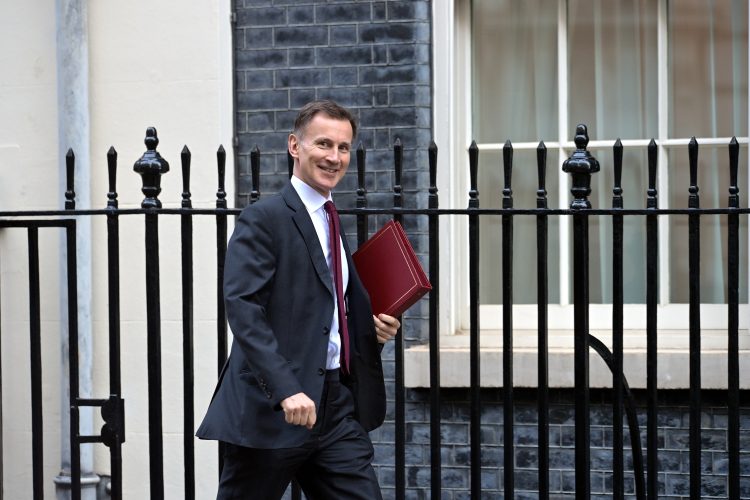Jeremy and the food system: The Autumn Statement’s impact on F&B
- Like
- Digg
- Del
- Tumblr
- VKontakte
- Buffer
- Love This
- Odnoklassniki
- Meneame
- Blogger
- Amazon
- Yahoo Mail
- Gmail
- AOL
- Newsvine
- HackerNews
- Evernote
- MySpace
- Mail.ru
- Viadeo
- Line
- Comments
- Yummly
- SMS
- Viber
- Telegram
- Subscribe
- Skype
- Facebook Messenger
- Kakao
- LiveJournal
- Yammer
- Edgar
- Fintel
- Mix
- Instapaper
- Copy Link
Posted: 30 November 2023 | Dr Clive Black | No comments yet
Clive Black explains what tax breaks, bussiness rate hikes and potentially inflationary measures in announced in the recent Autumn Statement mean for the food and beverage industry.


Jeremy Hunt announced his Autumn Statement in the House of Commons before a full budget in 2024
Chancellor of the Exchequer, Jeremy Hunt, stood at the despatch box of the House of Commons to give the nation a quite heavily pre-marketed and pumped up, nay political, Autumn Statement. Against the backdrop of the Kwarteng Show fourteen months earlier, Hunt’s performance could be characterised as genius. However, that misses the naivety and ill-thought-throughness of Truss and her doomed forty-four day spiral. So, given this somewhat chaotic context, what do Hunt’s plan mean for the food industry.
Well, first and foremost, it would appear that the Conservative Party loves cars. The amount of time that it spends pontificating on motor vehicle and battery factories compared to any interest in the largest industrial system in these Isles by a country mile (which would be the food system) is simply chalk and cheese. Yes, of course, it is great news for Wearside that Nissan is investing £2 billion, with considerable state aid, in its next generation electric vehicles. However, such interest and investment could arguably have a significantly bigger multiplier impact if replicated in the UK food system.
Indeed, for me, one of the key outcomes from the commentary of Hunt’s statement was that in some areas it touches upon an industrial strategy. While it is the quality of any such thinking that is more important than the process per se, it has to be hoped that future British governments, of whatever hue, think this way and, critically, that the food system brings itself together to look at conquering the big strategic challenges and opportunities of the day alongside the state. And I think those opportunities, especially around producing more food, in more animal welfare friendly, sustainable, labour process kind, and value added ways in these Isles is an especially big prize.
Spring Budget: Alcohol duty freeze and strengthening support
All of which brings us back to Hunt’s chat. The reality is that Government expenditure is very high (albeit the return on that expenditure is more questionable these days, as is the tax take) while the tax take is also near all-time levels. What does this mean? Well, the UK Government has to borrow enormous amounts to fund itself. With inflation at higher levels than has been the case in recent times, the cost of servicing that borrowing has mushroomed, further negatively impacting state spending capabilities. Lenders to the UK Government, therefore, expect a higher interest rate on the bonds they buy, all of which is quite constraining for budget setters like Hunt.
Further on the fundraising, tax-taking side, the UK Government has a problem with the payers here too. With a General Election on the horizon, the willingness to pay more and vote for the political party that suggests so is not evident. Hence, the Chancellor is between the rock and a hard place of the bond market, which buys UK debt, and the taxpayer, who is resisting pay more. The reality is that whoever is Chancellor in the next Government to 2028/9, he or she will face this tough backdrop. And as Mrs Truss reminded us, ‘take the p…’ with the bond market and your currency will slide, which means a number of things in economic terms, but most critically, it is inflationary.
Hunt engineered a little wiggle room in his statement and he chose to give something back to workers who pay National Insurance through a two percent cut in the employee rate, while also extending the expensing benefit to business from capital investment, although bizarrely, he did not incentivise investment in data sciences beyond physical capital. Such moves are, for workers in the food system and businesses investing in plant and equipment, welcome.
However, the hunter giveth and the hunter taketh away too. Less noisy at his box was the increase in the National Living Wage to 1144p/hour, which will also boost wage levels for employees but, we have to remember for businesses, also increases the operating cost of labour. Additionally, to use a bit of jargon, Hunt is also permitting an increasing number of employees to enter higher tax brackets through ‘fiscal drag’, as personal allowances remain static and so the tax take from many experiencing wage rises notably grows.
For businesses operating large property estates, Hunt delivered a proper poke in the nose with the return of business rates. Alongside the National Living Wage, this can be considered an inflationary move, particularly increasing the cost for major supermarkets and food and beverage chains. Despite being just one, huge, single site, remarkably, Harrods’ annual business rates will rise by over £600k in 2024/25. For major supermarket chains, it will be many tens of millions. Hunt knows the pressures of the high street and whilst there is relief for small retail operators, this broader rise alongside a fundamental lack of courage to reform business rates, especially between online and multi-channel/physical players is a blind spot amongst many of this tired Government where competence is also on the shallow side.
So, Jeremy Hunt, constrained by lending markets and the taxpayer, has chosen to move on business allowances and National Insurance while more broadly adjusting the deckchairs on the Titanic and squeezing public expenditure. Whether his ‘political’ statement has much resonance with the British electorate remains to be seen. He will be praying that negative externalities do not spike his drink with respect to more overt tax cutting in his March 2024 Budget, which, if so, will probably have to correspond with further public sector cuts.
The funding of the public sector is a wholly different economic debate but with so much clamour, one where the question does Britain really get what it pays for? can be expected to be aired more in the coffee bars, public houses and lounges of the nation.
Meanwhile, the British food system awaits a serious leader that will unlock its potential.
About the author
Dr Clive Black is Vice Chairman of Shore Capital Markets. Clive joined Shore Capital in 2003. After a Ph.D at Queen’s University of Belfast he was Head of Food Policy at the NFU, a strategic planner for Lord Haskins at Northern Foods plc before joining Charterhouse Tilney where he was a No.1 rated consumer analyst, becoming Head of Pan-European retail research at ING. He has been highly ranked in Thomson Extel surveys for many years.









